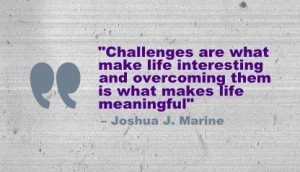Success Advice
How To Overcome The Circumstances Preventing You From Success

It’s no secret we all have circumstances we believe are stopping us from reaching the level of success we deserve. Those circumstances are different for everyone, I for example, have to battle the belief I can’t do big things because I live in a small town or I can’t have the same success men in my industry do only because I’m a young woman. This may only be my head trash and first world problems to have compared to the situations so many other individuals have to go through, however, our unfavorable circumstances are those things we believe are the ceilings keeping us small or the blade that keeps cutting us at the knees as soon as we gain speed.
In order to figure out how to overcome the challenges stopping myself and everyone else from reaching the goals and the vision we have for our life, I went on a mission to find someone who has overcome the worst of the worst and become a beacon of inspiration.
 Meet Andrew Griffiths, bestselling author, entrepreneur and global presenter. Andrew has 12 best selling books, published in over 65 countries around the world. He travels globally, presenting to tens of thousands of business owners annually, he was worked one on one with some pretty big names including CBS, every major bank in Australia, Telstra, the Stockland group and he even writes for Inc. (the worlds largest entrepreneurial website).
Meet Andrew Griffiths, bestselling author, entrepreneur and global presenter. Andrew has 12 best selling books, published in over 65 countries around the world. He travels globally, presenting to tens of thousands of business owners annually, he was worked one on one with some pretty big names including CBS, every major bank in Australia, Telstra, the Stockland group and he even writes for Inc. (the worlds largest entrepreneurial website).
I had a chat with Andrew and asked him a few question about the challenges he has faced and how he has dealt with them.
1. What challenges did you encounter growing up?
“I grew up as an orphan, my parents abandoned my sister and I when I was six months old. My childhood was very violent, moving in and out of foster care and different institutions, my everyday life was filled with uncertainty and fear.
As I grew older, I become attracted to the more unsavory temptations in life like petty crime, drugs, alcohol and so on – the type of predictable behavior you expect from an individual growing up in difficult circumstances. I didn’t know any different at the time so for me I thought this was normal.”
2. What was the pivotal moment that changed the course of your life?
“Over the years I have had many pivotal moments, however, one of the main ones would be when I was 17 years old and found myself in a situation I knew wouldn’t end well. I was standing at the end of a driveway waiting to go out with some friends and run a muck.
I heard the little voice in my head telling me that I knew what was going to happen that night and I’m at a crossroads. Do I turn right, get in the car with these people and potentially end up in juvenile detention or worse. Or do I turn left, walk back inside and start my life fresh?
It’s during these moments that you get to decide in what direction you want your life to head in. I chose to turn left, go back inside and I started packing my bags. I decided this life was not the life I wanted to live, so I left town and moved to Sydney.”
3. Are you glad you didn’t have an ideal childhood?
“Absolutely! I met my biological father when I was 22 years old. It was not the warm family reunion I had hoped for. This man was an alcoholic and all he wanted from me was money. I thought about that disappointing event and actually became grateful – I realized my childhood wouldn’t have been any better with him in it.
I’m a firm believer in all the unfavorable circumstances I have been through in my childhood has lead me to become the successful man I am today. And to be honest, I am really happy with who I am.”
“Circumstances do not make a man, they reveal him.” – Wayne Dwyer
4. Even with your success in business and writing, do you still encounter challenges or unfavorable circumstances in life? How do you deal with these?
“Definitely – everyday in-fact! I think if you’re involved in business or you’re constantly bettering yourself, you will always go through ups and downs – it’s how it works. What I have learnt is to be resilient.
After losing thousands of dollars, having to deal with difficult clients and going through almost every business challenge known to man – resilience has always kept me in the game, coming back stronger and wiser than before.
I can cope with the good times and I can cope with the bad times. It doesn’t matter how successful someone is, everyone has challenges and setbacks rest assured.”
5. What advice would you give to someone who believes their circumstances are holding them back in life?
“To me when someone says that, I believe it’s just a copout. It’s an excuse so many use. When people lead a statement with, “if only I had this or I never got that or my situation is different etc” I stop listening. From my experience, their excuse is rarely the cause for their lack of success.
I have very good friends of mine who grew up with tons of money and every opportunity you could ask for but lead very average and far from perfect lives. The best way to face the circumstances you believe are holding you back is to change your mindset towards them.
You’re in a tough situation? Use that as motivation. Life gives us two choices when it comes to adversity – become bitter or become better.”
6. What steps would you recommend someone take to overcome the circumstances holding them back in life?
“Change! Change! Change! Change the people who are around you. If you’re spending your time with a bunch of ‘no-hopes’ then you’ll become exactly like them – as simple as that.
Change your mindset and change your state. Buy some motivational material and begin studying it. Find mentors who you admire and start mimicking them – what good habits do they have, what habits don’t they have more importantly.
You have to change something. If you want a radical change in your life and your circumstances you need to take radical action. Whatever that looks like for you – identify what it is that’s holding you back from the life you want and start taking radical steps to create change.”

Andrew is an individual who has overcome such adversity and who has become a person not only successful in business and financially but an individual who makes a positive impact in the lives of many daily.
Hopefully you have learnt a few tips to help you overcome your challenges and your setbacks from hearing Andrew’s story.
What would you say is your top takeaways? Leave a comment below.
Here are my key takeaways:
- It doesn’t matter how successful someone is, everyone has challenges and setbacks
- Learn to become resilient
- Blaming your circumstances for not achieving success is just a copout
- Life gives us two choices when it comes to adversity – become bitter or become better
- If you want a radical change in your life and your circumstances you need to take radical action
Business
Why Smart Entrepreneurs Are Quietly Buying Gold and Silver
When stocks, property, and cash move together, smart business owners turn to one asset that plays by different rules.

You’ve built your business from the ground up. You know what it takes to create value, manage risk, and grow wealth. But here’s something that might surprise you: some of the most successful entrepreneurs are quietly adding physical gold and silver to their portfolios. (more…)
Business
The Simple Security Stack Every Online Business Needs
Most small businesses are exposed online without realising it. This simple protection stack keeps costs low and risks lower.

Running a business online brings speed and reach, but it also brings risk. Data moves fast. Payments travel across borders. Teams log in from homes, cafés, and airports. (more…)
Business
If Your Business Internet Keeps Letting You Down, Read This
From smoother operations to better security, dedicated internet access is quietly powering today’s high-performing businesses.

Today, a dependable internet service is the bedrock for uninterrupted business operations. Many organizations rely on stable online connections for communication, data transfer, and customer interaction. (more…)
Did You Know
How Skilled Migrants Are Building Successful Careers After Moving Countries
Behind every successful skilled migrant career is a mix of resilience, strategy, and navigating systems built for locals.

Moving to a new country for work is exciting, but it can also be unnerving. Skilled migrants leave behind familiar systems, networks, and support to pursue better job opportunities and a better future for their families. (more…)
-

 News3 weeks ago
News3 weeks agoBrandon Willington Builds 7-Figure Business by Ignoring Almost Everything
-

 Health & Fitness4 weeks ago
Health & Fitness4 weeks agoWhat Minimalism Actually Means for Your Wellness Choices
-

 Did You Know4 weeks ago
Did You Know4 weeks agoWhy Most Online Courses Fail and How to Fix Them
-

 Business4 weeks ago
Business4 weeks agoIf Your Business Internet Keeps Letting You Down, Read This
-

 Business2 weeks ago
Business2 weeks agoEntrepreneur’s Guide to Pay Stubs: Why Freelancers and Small Business Owners Need a Smart Generator
-

 Business2 weeks ago
Business2 weeks agoThe Salary Shift Giving UK Employers An Unexpected Edge
-

 Scale Your Business2 weeks ago
Scale Your Business2 weeks ago5 Real Ways to Grow Your User Base Fast
-

 Business2 weeks ago
Business2 weeks agoThe Simple Security Stack Every Online Business Needs






























5 Comments